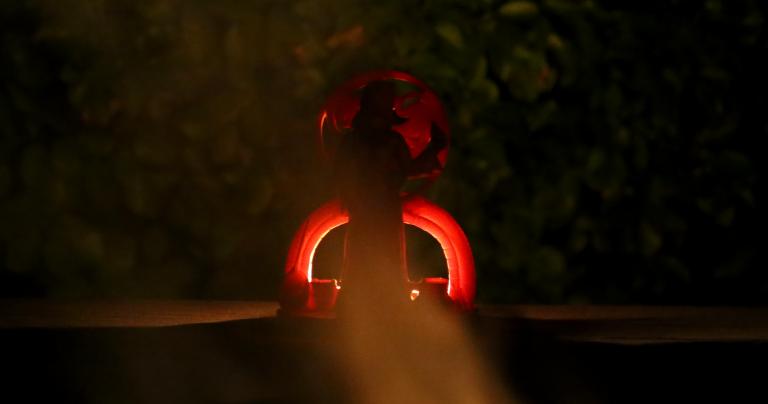I write a lot about mystical, magical, and religious experiences. These experiences are part of modern Paganism and they’ve been part of virtually every religion ever known to humanity. But Protestantism’s distrust of first-hand experience and atheism’s denial of any external religious reality mean that those of us who have these experiences are often viewed with extreme skepticism.
For most of us, we can simply say “I know what I saw/heard/felt” and go about the work of figuring out what it means. If skeptics get too annoying, there’s always the “block” button.
But what happens if you also have some sort of mental health issue? Some condition that requires counseling and/or medication?
Then you’re left dealing with a mental health industry that is built on non-theistic principles and is staffed largely by people who identify as Christians, of one type or another. People whose idea of reality does not include the presence of Gods and spirits in everyday life. Getting help that is both effective and respectful can be extremely difficult.
Below is the first-hand account of such an incident. The person in question wishes to remain anonymous, but I know them (and not just on the internet) and I have no doubt they’re telling the absolute truth.
Their account is presented in story form, but it has not been dramatized – this is their best recollection of how the conversation went.
A Pagan who is bipolar and has mystical experiences
“Psychotic disorder?”
“Yep,” I said, looking out my psychiatric nurse practitioner’s window and nodding. My last psychiatrist had recently sent me a letter for my disability records at work stating my initial diagnosis from over a decade ago. There was a secondary diagnosis on that page, though, that I hadn’t been expecting. “Type 2 bipolar… and psychotic disorder.”
I saw his hands in his lap twitch thoughtfully.
“You were diagnosed, when?”
“I was 13.”
His eyebrows shot up. “Oh, my. That’s very young.” He gave me a keen look and softened his voice a bit. “Do those diagnoses… seem right to you?”
“I know that’s a tricky age for diagnosis, but the bipolar, I think is probably true. When I miss my meds on accident I still have symptoms, and they’re pretty by the book.” I gave him a quick laundry list. He agreed that they sounded about right. “But the psychotic disorder diagnosis… I am… doubtful. And I am also here to ask you about that.”
He nodded. “Please go ahead.”
I took a breath, and let it out.
“I told my psychiatrist when I was younger that sometimes at night in my room I felt I could… sense presences, sort of. Beings. Nothing auditory or visual, or with any words, just like… there were entities there. Like I wasn’t alone. I also told her that I felt vibes coming off people sometimes almost like they were touchable waves of energy. I was deeply, deeply religiously Pagan at the time, and spent time with other Pagans. Both these experiences are normal within the context of Pagan culture. And yet…”
I felt a surge of disappointment in my chest remembering the conversations.
“When I told her those first two things, she told me they sounded like delusion to her, and she would lean toward classifying them as psychosis.”
I saw my new practitioner start to nod, then stop himself as if unsure.
I shook my head. “Here’s the catch. Paganism is not a small group of eccentrics. It’s an actual large-scale faith. The US Armed Forces even recognizes it – a fallen Marine can get a pentacle on their tombstone. The idea of sensing entities to a Pagan is no different than a Christian in church saying they can feel the Holy Spirit in the room. Or that they are aware of the presence of angels. And I don’t find the claim of being able to feel energy coming off people much more far-out than the claim that a blessed wafer turns to human flesh in one’s mouth.
“I’ve also never actually shown other signs of psychosis, even though I still have bipolar symptoms sometimes. Now I reach out to my doctor to ask for a letter, and I see this diagnosis on my medical record.
“So I guess my question is… what does the DSM say about this? How does science actually define delusion?”
I had been on a roll, and not paying attention to his expressions. As I gave him a moment to respond, I examined the psych nurse’s face and immediately realized two things with a pang of guilt: he is Christian, and he is experiencing doubt.
He cleared his throat. “Well,” he began. He adjusted in his chair, picked up a pen off the desk beside him, tapped the pen four times on the desk, and put it back down. He licked his lips. “According to the DSM, delusion is not actually defined by…what’s objectively true or not true. But rather…” His eyes darted out the window. “But rather… how many people… also believe it.”
I let my face say: You’re kidding me.
I repeated back, “So it’s about shared reality. Not provable reality. The more people who hold the belief, the more credible it is.”
He nodded. “That’s mostly right, yes.”
“Wow.”
I leaned back in the chair and stared at the floor, taken by a flush of hot anger for myself and others like me. But I wasn’t going to punish him for delivering information, nor ask him to be my witness in this. I took a moment to let the information soak in.
“Thank you for answering my question,” I said finally, with as much sincerity as I could muster.
He said some “No problem” kind of words, but his face had the look of someone who is very much struggling with a problem.
I’m an engineer, not a psychologist
I’m a Druid who makes his living as an engineer. I’m not a psychologist or a psychiatrist. I occasionally do pastoral counseling and spiritual guidance comparable to what a Catholic priest or a Protestant minister would do. But I know the limits of my expertise, and when someone’s needs exceed my skills I refer them to a mental health professional.
This is one of those times. I asked two mental health professionals for their take on this – not for advice for this person, but rather general commentary on standard practices and recommendations for how to find a friendly therapist.
Cindy Jacobson, Licensed Professional Counselor and Unitarian Universalist
Cindy Jacobson (MEd, LPC) is a Licensed Professional Counselor in Denton, Texas and a fellow Unitarian Universalist. I’ve referred Pagans and other non-Christians to Cindy, because I trust her to treat everyone with dignity and respect.
“I just read this document and sadly was not surprised by it but definitely saddened by it. This is a problem in our profession and clients should be highly encouraged to carefully screen the clinician before seeing them, especially if they may be discussing things that they think may be unfamiliar or “out of the range of normal” for the clinician.
There are many clinicians who clearly profess to be Christian counselors. To me that is against our ethics as we are supposed to meet clients where they are and not let our biases interfere with the treatment of our clients. If we meet a client and learn that we have personal biases that may interfere with treatment, we are supposed to refer them out.
This individual being diagnosed at the age of 13 with a psychotic disorder based on what was mentioned here makes no sense to me. I think the psych nurse also knew this by their response but then was conflicted, maybe because of their own beliefs interfering. This is when it would be great for them to have resources where they could say to the client “it might be helpful for you to talk to this person as I think they may have more experience in this area than I have.”
It is sad but it is really necessary for a client to prescreen the therapist by asking questions prior to or at least in the initial session if they think they may be uncomfortable. I always ask a client at the end of the intake session if they are comfortable working with me and encourage them to let me know if they ever feel as if we are not a good fit. I think that it is crucial for a client to feel heard and accepted as they are and want them to know I will help them find someone else if I am not the best fit for them.
I do apologize for our profession when we fail clients and are not our best selves. Some people are not clearly in touch with their own biases and can at times do unnecessary harm to clients.”
Anthony Rella, Licensed Mental Health Counselor and Pagan
Many of us in the Pagan community know Anthony Rella (MA, LMHC). He’s one of us, and also a licensed counselor in Seattle. His response was longer and I’m reluctant to cut any of it, so here it is in its entirety.
“My observation is that many folks these days feel it has to be either/or with psychosis and spirituality, but in my work with psychotic people it really seems to be more both/and. A person could be having very valid spiritual experiences and also be experiencing psychotic symptoms that make it difficult for them to safely process and integrate their spiritual work. Often people with distressing psychotic symptoms experienced early violations of their autonomy and boundaries that make it difficult for them to have personal and spiritual boundaries, hence being flooded by psychic information along with the detritus of their unconscious.
I agree with the nurse practitioner that we can only measure delusions by how much they match shared consensus reality within the person’s culture. I would also note that a delusion is also evaluated by its relative inflexibility—a person who is truly delusional would be incapable of questioning their belief about their experience or entertaining alternative interpretations of what is happening.
In the past few decades the trend in psychology has been to emphasize examining a person’s experience within their cultural context. The whole problem of “abnormal psychology” is that, very simply, it is any kind of mental or emotional presentation that is not normal for that person’s community. But abnormal for your community is not necessarily abnormal in my community.
Any therapist who is seeing a client who has a religious, cultural, or ethnic culture that is completely foreign to the therapist should be doing their research into that culture. One of the things I strongly encourage Pagan and polytheist clients to do is to find a coreligionist in their community, ideally one with some authority, who is willing to do a consult with the therapeutic practitioner. This has a number of benefits. One is that it takes the pressure off the client (who is in a very vulnerable situation) to have to educate or worry about their therapist. Another is that it helps the therapist ask questions that would be awkward or problematic to discuss with their client.
I can’t stress enough how helpful this is. I had a client who presented as highly psychotic with religious delusions in a Christian context, engaging in behaviors that were very dangerous to themself. I was able to speak with their pastor to get clarity about what beliefs and practices were normative and which ones the pastor themself thought were counter to their religious teachings and practices.
If I were talking to the person in the anecdote, I would encourage them to find a person willing to talk to the therapist, and then go into the session with the therapist and say something like—“Because of the experiences I told you about, I’m really worried about my therapists pathologizing my spirituality. When we talked about my diagnoses and my spiritual experiences, you seemed preoccupied or like you were judging me in some way. I have this person in my community who’s willing to answer questions, can I sign a release of information so you can schedule a consultation?”
For some of us it feels really scary to confront the therapist, and I cannot promise that every therapist will respond well. But I can almost guarantee that the therapist who can respond with curiosity and nondefensiveness is one that will help you do good work.
For those who’d like to avoid this problem, if you have the privilege of being able to choose one therapist from a variety, you could be upfront with your needs. “I have vivid spiritual experiences that I need to talk about and I want to be sure that you’re not going to judge them or pathologize them.” If the therapist is unable or unwilling to offer that, then best practices would be for them to find appropriate referrals for you.
I do caution people not to get hung up on looking for unicorns. The single most important factor for therapeutic success is to feel a sense of warmth and connection with your therapist. I would gauge the strength of the therapist more by how willing they are to listen and earnestly engage with your need rather than whether they say the exact things you hope to hear. I have had great therapists who shared very little of my life experience but nevertheless helped me.
That being said, as a Pagan I would be extra cautious in engaging with therapists who overtly market their Christianity. I would look for words like Transpersonal and psychospiritual in their orientations, as therapists in those models acknowledge spirituality as an important part of overall mental health. While contemporary Pagans and polytheists may feel hesitation about Jungian theory, my experience has been that Jungian-oriented therapeutic practitioners tend to be very comfortable with and embracing of spiritual experience. They really swim in the deep end.”
TL;DR summary
If you relate to any of this, go back and read it carefully – it’s that important for you.
I hope everyone else will read it too – this affects a good number of people in our communities, and we need to be as informed and educated as we can. But this is far longer than my typical blog posts and I know some of you won’t read it all. So here’s an engineer’s summary of the counselors’ advice.
- Delusions can only be measured by how much they match shared consensus reality within a person’s culture. What’s normal for Wiccans isn’t normal for Presbyterians, and vice versa.
- Delusion is also evaluated by relative inflexibility. A person who is truly delusional would be incapable of questioning their belief about their experience or entertaining alternative interpretations of what is happening.
- You can have very valid spiritual experiences and also be experiencing psychotic symptoms – one does not rule out the other.
- Therapists are supposed to be religiously neutral, but many aren’t, and some don’t even try.
- You may not be able to find a therapist who shares your religious outlook, but you should be able to find one who respects yours.
- If necessary and possible, ask your therapist to consult with an authority figure in your religious community to discuss what is and isn’t normal in your tradition.





















